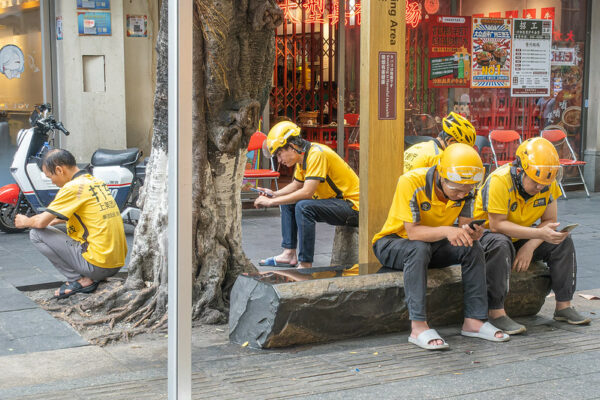In this edition: Chinese travelers in Afghanistan and Malawi, settling down in Norway, the rising popularity of low-priced housing in China’s backward cities, why do Chinese men not want to marry any more, Chinese-American stand-up comedy and more…
What does the capital of Afghanistan look like?
The Chinese travel vloggers in this video walk (rather randomly?) as benefactors through the steep alleys of Kabul and treat the small children to sweets, while they pinch their noses against the stench of the open sewer. In the absence of an interpreter, communication only takes place non-verbally and in Chinese. The vloggers do not share many key facts about Kabul, but they do show vivid impressions of the city. Small children carry heavy buckets of water up the mountain, because there is no running water. Others use donkeys for this. The Afghans do not seem unfriendly, but there is quite a language barrier. At the end of the video we see the city lying in the afternoon sun and the air is filled with the sound of prayer.
Difficulty level: HSK 4
愣住了lèng zhù lewas stunned, froze in place毛驴máolǘdonkey水沟shuǐgōuditch, gutter冲脑壳chōng nǎoké(colloquial) wash one’s head, cleanse the mind (literal translation: rinse head) / “hits the skull” (translation from subs)给他们发糖gěi tāmen fā tánggive them candy阿富汗首都Āfùhàn shǒudūcapital of Afghanistan上坡下坡shàngpō xiàpōuphill and downhill垃圾堆lājīduīgarbage pile, trash heap祷告dǎogàopray爬楼梯提水pá lóutī tí shuǐclimb stairs to carry water急死了jí sǐ letoo crowded
Traveling from X to Malawi
A Chinese couple is traveling from Tanzania to Malawi, crossing the border on foot. Getting from A to B by different means of transport is quite an adventure in the hot hustle and bustle of East Africa and you can feel the irritation of the two travelers in this video. Some useful travel vocabulary to be found here.
Difficulty level: HSK 4-5
不知道会不会遇到什么麻烦bù zhīdào huì bù huì yùdào shénme máfanI don’t know if we will run into any trouble过海关guò hǎiguāngo through customs车子被几个人拦下来了chēzi bèi jǐ gè rén lán xiàlái lethe car was stopped by a few people司机下车了sījī xià chē lethe driver got out of the car他一升油应该也能拉到不少客tā yī shēng yóu yīnggāi yě néng lā dào bù shǎo kèwith one liter of fuel, he should be able to carry quite a few passengers我们现在打了一个摩托车wǒmen xiànzài dǎ le yī gè mótuōchēwe just hired / got on a motorcycle我发现这里真的是一个自行车大国wǒ fāxiàn zhèlǐ zhēn de shì yī gè zìxíngchē dàguóI realized this place really is a nation of bicycles这个城市基本上没有柏油马路zhège chéngshì jīběn shàng méiyǒu bǎiyóu mǎlùthis city basically has no asphalt roads晚上尽量还不要在外面wǎnshang jǐnliàng hái bùyào zài wàimiàntry to avoid being outside at night
The first days of moving to Norway
Ever wondered what it’s like to settle down in Norway? Cece moved to the Scandinavian Fjord-country recently and shared this sympathetic vlog, documenting her experiences like swimming among the modern-day vikings in Stavanger.
Difficulty level: HSK 4-5
我落地第二天就去警察局办理居留卡wǒ luòdì dì èr tiān jiù qù jǐngchá jú bànlǐ jūliú kǎI went to the police station to apply for a residence card on the second day after landing我渐渐安顿一下wǒ jiànjiàn āndùn yīxiàI’m gradually settling down我租了一个月的Airbnbwǒ zū le yī gè yuè de AirbnbI rented an Airbnb for a month我刚一直在犹豫wǒ gāng yīzhí zài yóuyùI was just hesitating我到底要不要下水wǒ dàodǐ yào bù yào xiàshuǐshould I go into the water or not?我用画外音的形式聊聊天吧wǒ yòng huàwàiyīn de xíngshì liáo liáotiān baLet me chat in the form of a voiceover我们录了个德国和挪威相比较的视频wǒmen lù le gè Déguó hé Nuówēi xiāng bǐjiào de shìpínwe recorded a video comparing Germany and Norway给我带来踏实和治愈感gěi wǒ dàilái tàshí hé zhìyù gǎnIt brings me a sense of security and healing
The rewards and costs of buying low-priced housing in China
Life in China’s major cities has become less attractive, especially for young people due to high cost of housing. 小叔 explores the new trend of escaping the rat race by buying cheap real estate (he calls it 白菜价的房) in relatively small and less densely populated cities in China’s northeast to 躺平 or lie flat and enjoy doing nothing. What are the pros and cons of this plan B, is it worth it? For one thing, life in these cities is slower, simpler and almost seems like a trip back into the past. The Soviet-style houses may be affordable, but also of lesser building quality. Public facilities are lacking or in a state of decline, also safety seems an issue, with blocks of houses publicly accessible and unguarded. Could the influx of young people change this and establish new communities?
Difficulty level: HSK 5
低价房城市dījià fáng chéngshìcity with low-cost housing东三省Dōng sān shěng the three northeastern provinces of China (Liaoning, Jilin, Heilongjiang)一探究竟yī tàn jiūjìngto explore and find out the truth生活成本太低了shēnghuó chéngběn tài dī lethe cost of living is too low年轻人的乌托邦niánqīng rén de wūtuōbānga utopia for young people冲动地来,冲动地离开 chōngdòng de lái, chōngdòng de líkāi came on impulse, left on impulse躺平圣地tǎngpíng shèngdìa sanctuary for the “lying flat” lifestyle白菜价的房 báicài jià de fáng houses at a cabbage price (extremely cheap houses)上个世纪的样子shàng ge shìjì de yàngzilooks like it’s from the last century
Why Chinese Immigrants are FLEEING BACK to China for Retirement
In this podcast episode, Rita and her guest compare their experiences with the US, Canadian and Chinese health care systems.
Difficulty level: HSK 4-5
做检查
zuò jiǎnchá
to do a check-up; undergo an examination健康问题 jiànkāng wèntí health problems愧疚感kuìjiù gǎnfeeling of guilt死活不过来 sǐhuó bù guòlái won’t come over no matter what养老 yǎnglǎo retirement; to care for the elderly创伤 chuāngshāng trauma; injury医疗保险yīliáo bǎoxiǎnhealth insurance专科医生zhuānkē yīshēngspecialist doctor医疗体系yīliáo tǐxì healthcare system
Why Chinese Guys Don’t Want To Get Married Anymore?
In previous editions of Chinese vocabulary notes, I included several videos about China’s declining birth rate and young people not willing to marry anymore. So far the discussion mostly focused on women being in the (financial) position to be more picky and fewer men being able to meet these new standards. This is one side of the problem, but what about the men? After all, Chinese men have to buy their future wives more than a wedding ring, as they are supposed to provide housing, transport, traditional jewelry and a large sum of money. I can’t help wondering if these traditions have out-served their purpose in present-day China, since instead of supporting young couples’ future and security, they seem primarily a burden that fewer and fewer people are willing to carry. Eileen and her guest discuss this matter at length and also mention the previous generation’s responsibility.
Difficulty level: HSK 4 – 5
单身 dānshēn single (unmarried)彩礼 cǎilǐbride price五金wǔjīn five golds (refers to traditional betrothal gifts, usually jewelry or valuables)没日没夜méi rì méi yèday and night (working tirelessly)娶媳妇 qǔ xífù to marry a wife无限的循环wúxiàn de xúnhuánendless cycle传宗接代chuánzōng jiēdài to carry on the family line男生不想成为结婚后的赚钱工具nánshēng bù xiǎng chéngwéi jiéhūn hòu de zhuànqián gōngjù men don’t want to become money-making tools after marriage.
谈恋爱tán liàn’àito date; to be in a romantic relationship年轻人不结婚不是这一代的错,是上一代人的错。niánqīng rén bù jiéhūn bù shì zhè yī dài de cuò, shì shàng yī dài rén de cuò. Young people not getting married is not the fault of this generation, but the previous one.拿到二婚的彩礼 ná dào èrhūn de cǎilǐ to receive a bride price for a second marriage街头采访 jiētóu cǎifǎngstreet interview怎么守住我老婆 (别让她出轨)zěnme shǒu zhù wǒ lǎopó (bié ràng tā chūguǐ)how to keep my wife from cheating钱不是万能的,但是没有钱是万万不能的qián bù shì wànnéng de, dànshì méiyǒu qián shì wànwàn bùnéng de money isn’t everything, but without money, nothing is possible有钱能使鬼推磨 yǒu qián néng shǐ guǐ tuī mò money can make the devil push the mill; money talks
English-Chinese stand-up comedy in the US
Lele and Olivia discuss the challenges of bilingual stand-up comedy (脱口秀) in an American-Chinese context. Is there a better non-native Chinese speaker active on YouTube than LeLe Farley? I found this 30 minute video both insightful and entertaining. I only ‘wrote down’ a few interesting expressions, actually there’s a lot more to be found here.
Difficulty level: HSK 5 – 6
脱口秀 tuōkǒuxiù talk show; stand-up comedy双语shuāngyǔbilingual脱口秀演员tuōkǒuxiù yǎnyuántalk show comedian; stand-up comedian离开自己的舒适区 líkāi zìjǐ de shūshìqūto leave one’s comfort zone段子duànzi joke; comedic bit嘲讽cháofěng to mock; satire辱华 rǔ Huá insult China表达观点 biǎodá guāndiǎnexpress an opinion
我比你了解共产党wǒ bǐ nǐ liǎojiě gòngchǎndǎng I understand the Communist Party better than you走了弯路zǒu le wānlù took a wrong turn; went down the wrong path下台的机会xiàtái de jīhuìopportunity to step down落点luòdiǎn focus; point of impact灌鸡汤guàn jītānggive a pep talk; feed (someone) motivational quotes (literally “pour chicken soup”)
That’s it for this early autumn edition. Hope you enjoyed it. I’ll be back with more Chinese vocabulary notes soon!
Disclosure: These are affiliate links. They help me to support this blog, meaning, at no additional cost to you, I will earn a small commission if you click through and make a purchase.


